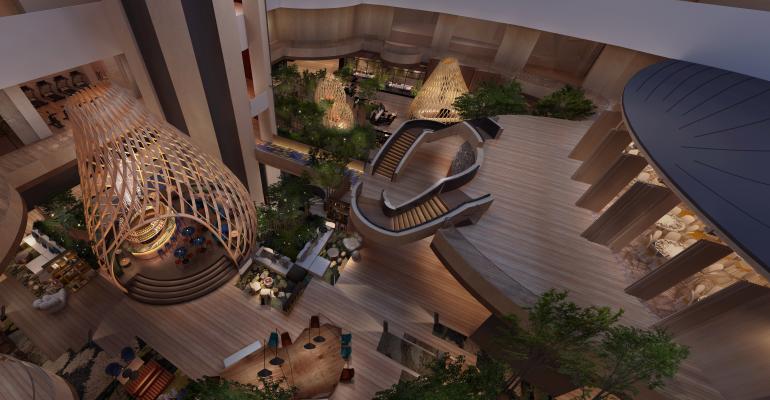Sponsored by Singapore Tourism Board

Compared to much of the world, Singapore has a well-established track record when it comes to sustainability. The most recent evidence of that is the Singapore Green Plan, which focuses on six pillars of sustainability and establishes ambitious green goals to achieve by 2030.
That level of commitment to the environment is evident among Singapore’s MICE players as well. As business travel rebounds, event planners will be prioritizing destinations and partners following eco-friendly practices. Singapore has developed a comprehensive and innovative approach to greener events—from the minute MICE groups arrive in Singapore, to how venues operate, even to the foods served.
Organizers of the 2018 Schneider Electric Global Innovation Summit, for example, held an event free from single-use paper and plastic materials. The Marina Bay Sands also provided summit attendees with a fully sustainable, earth-friendly menu. ITB Asia in 2014 introduced waste and energy-saving practices that trimmed its overall carbon footprint 34 percent. And, as a testament to its leadership in sustainability, Singapore has welcomed prominent green events, including Ecosperity Week and CSRWorks International’s Sustainability Reporting Summit, which foster greater green dialogue.
 Award-Winning MICE Infrastructure
Award-Winning MICE Infrastructure
Many of Singapore’s MICE venues have been constructed or renovated to ensure future greener operations, and a variety of organizations have recognized their progress. In addition, the venues have instituted procedures to reduce their carbon imprint even further.
The sustainable Singapore journey begins on arrival at Changi Airport. Changi Airport Group (CAG), recipient of the 2019 Apex Corporate Sustainability Award, has committed to capping its emissions by 2030, replaced air conditioning fans with energy-efficient versions to reduce energy consumption, installed smart lighting across several terminals, and increased its use of reclaimed wastewater by two-thirds.
In 2021, Resorts World Sentosa earned green certification from the Global Sustainable Tourism Council. The property has adopted detailed strategies for saving energy and water, reducing single-use plastic and food waste, protecting sensitive wildlife, providing education and advocacy, and procuring supplies responsibly.
MAX Atria, the convention wing of Singapore EXPO, was the first MICE venue to receive Singapore’s Building and Construction Authority Green Mark Platinum Award. The facility continues to improve its green profile by reducing materials sent to landfills, upgrading lighting, encouraging use of personal water bottles, offering exhibitors modular structures and carpentry that can be repurposed, ordering food more accurately, and composting food waste into fertilizer.
Sands Expo and Convention Centre at Marina Bay Sands, already a LEED-Platinum and ISO20121-certified venue, achieved carbon neutral status in 2020. The integrated resort has invested in energy efficient infrastructure to reduce its carbon footprint. For example, an intelligent building management system helped save more than 7.4 million KWh of energy during its first eight years of use.
 More Measures to Grow Greener
More Measures to Grow Greener
Singapore’s MICE players continue to rethink processes and operations in striving for a greener profile.
To source more food locally, a number of Singapore hotels have installed their own food gardens. The Fairmont Singapore and Swissotel The Stamford went a step further, adding a rooftop aquaponics farm. The innovative installation allows the hotels to efficiently grow their own vegetables and seafood without pesticides and using far less water than traditional farming methods.
Parkroyal Collection Marina Bay, a new eco-conscious concept from Pan Pacific Hotels Group, opened early in 2021. Features include an indoor garden, energy efficient windows, guestroom filtered water systems, solar panels, and motion sensors to regulate energy use. A food waste management program transforms kitchen scraps into fertilizer for the hotel’s garden.
The Pan Pacific Orchard hotel, set to open in 2022, is being designed as a low-waste property and is striving to be zero-waste. The plan includes self-contained systems for harvesting rainwater, recycling water, and composting food waste, along with huge vertical gardens that provide a green space and reduce the building temperature.
An Industry Committed to Sustainability
All stakeholders in the MICE industry stand to benefit from Singapore’s commitment to hosting green events. The Singapore Tourism Board has documented the city’s progress in establishing a sustainable environment for MICE events, including a list of nearly 30 green venues and resources for MICE event planners.
For the growing number of organizations and attendees mindful of their impact on the environment, ensuring events are as sustainable as possible is a high priority. With sustainability already a top priority in Singapore, the infrastructure and the mindset to support green programs is firmly in place.





